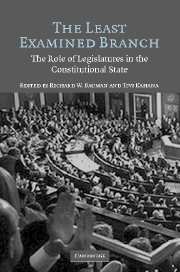Book contents
- Frontmatter
- Contents
- Foreword: Legislatures in the Constitutional State by Amy Gutmann
- Contributors
- New Ways of Looking at Old Institutions
- PART ONE LEGISLATURES AND DEMOCRATIC THEORY
- PART TWO LEGISLATING AND DELIBERATING IN THE DEMOCRATIC LEGISLATURE
- PART THREE CONSTITUTION MAKING BY LEGISLATURES: THE EXPLICIT VERSION
- 9 Legislatures as Constituent Assemblies
- 10 Legislatures and the Phases and Components of Constitutionalism
- 11 Legislatures and Constitutional Agnosticism
- 12 Constitutional Amendments and the Constitutional Common Law
- PART FOUR CONSTITUTION MAKING BY LEGISLATURES: THE IMPLICIT VERSION
- PART FIVE CONSTITUTIONAL INTERPRETATION AND APPLICATION BY THE LEGISLATURE
- PART SIX IS LEGISLATIVE CONSTITUTIONALISM POSSIBLE?
- PART SEVEN THE LEGISLATURE IN DIALOGUE: DOMESTIC AND INTERNATIONAL CONTEXTS
- Index
10 - Legislatures and the Phases and Components of Constitutionalism
Published online by Cambridge University Press: 06 August 2009
- Frontmatter
- Contents
- Foreword: Legislatures in the Constitutional State by Amy Gutmann
- Contributors
- New Ways of Looking at Old Institutions
- PART ONE LEGISLATURES AND DEMOCRATIC THEORY
- PART TWO LEGISLATING AND DELIBERATING IN THE DEMOCRATIC LEGISLATURE
- PART THREE CONSTITUTION MAKING BY LEGISLATURES: THE EXPLICIT VERSION
- 9 Legislatures as Constituent Assemblies
- 10 Legislatures and the Phases and Components of Constitutionalism
- 11 Legislatures and Constitutional Agnosticism
- 12 Constitutional Amendments and the Constitutional Common Law
- PART FOUR CONSTITUTION MAKING BY LEGISLATURES: THE IMPLICIT VERSION
- PART FIVE CONSTITUTIONAL INTERPRETATION AND APPLICATION BY THE LEGISLATURE
- PART SIX IS LEGISLATIVE CONSTITUTIONALISM POSSIBLE?
- PART SEVEN THE LEGISLATURE IN DIALOGUE: DOMESTIC AND INTERNATIONAL CONTEXTS
- Index
Summary
All constitutions seek to enable government, structure its powers, and limit them. To do this effectively, constitutions must enjoy a legitimacy which is broader and deeper than that enjoyed by any specific organ of government or any specific policy or piece of legislation. A constitution's fundamental nature is supposed to provide elements of the “civil religion” that binds all members of society and all major groups within it to the constitutional system. Obtaining the legitimacy needed for fulfilling such a major role in any society depends, to a great extent, on the different roles various organs play in framing and adopting constitutional regimes, and on the roles they play within these regimes.
The roles played by various organs in the constitutional process should also differ in accordance to the three distinct elements of a constitution in terms of structure and functions: credos, rules of the game, and bills of rights. Thus, the roles played by various organs should depend on a complicated interrelationship of both the phase of the constitutional process and the part of the constitution under discussion.
In this chapter, I argue that legislatures and courts have different roles in the phases of constitutionalism. The role played by legislatures (or, more accurately, by the people's representatives) is almost exclusive during constitution making, central when amending the constitution, and then diminishes during the application/interpretation of the constitution.
- Type
- Chapter
- Information
- The Least Examined BranchThe Role of Legislatures in the Constitutional State, pp. 198 - 213Publisher: Cambridge University PressPrint publication year: 2006
- 1
- Cited by



